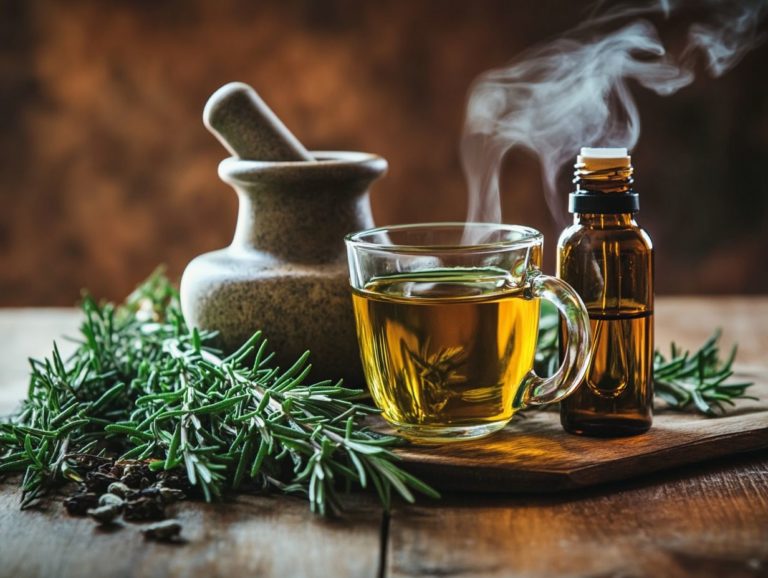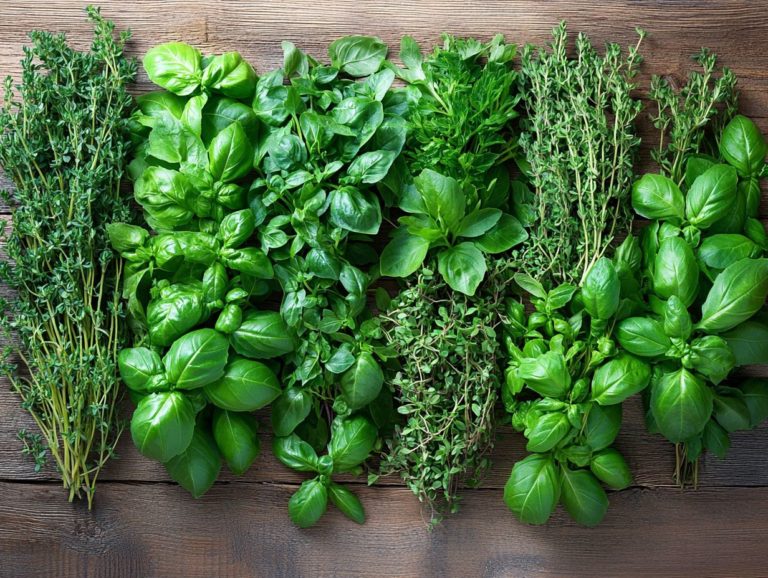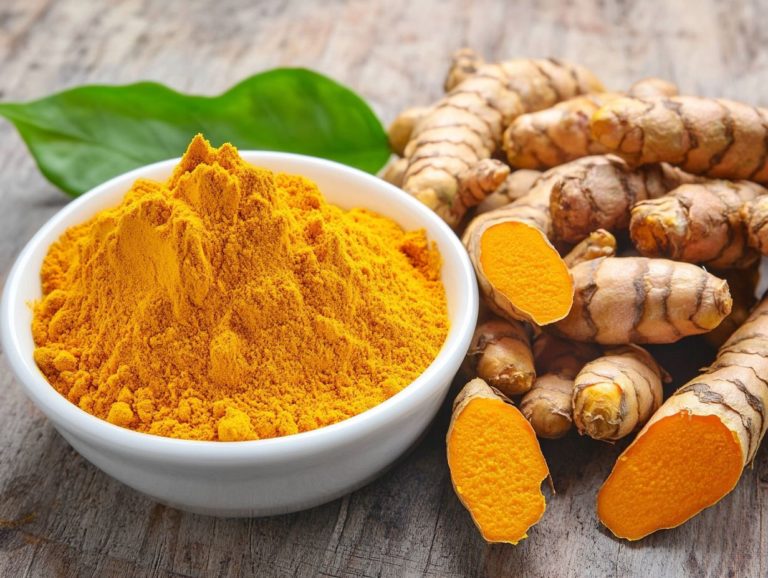5 Common Herbs and Their Benefits
For centuries, herbs have captivated our senses and boosted our health! Consider five common herbs turmeric, ginger, garlic, cinnamon, and chamomile. Each of these brings a powerful advantage to your well-being. From reducing inflammation to promoting relaxation, they provide a natural path to better health.
Explore how to weave these herbs into your diet, be aware of potential side effects, and discover some enticing recipes to experiment with. Uncover how these humble ingredients can elevate both your health and culinary adventures!
Contents
- Key Takeaways:
- 1. Turmeric: Anti-Inflammatory and Antioxidant Properties
- 2. Ginger: Helps with Nausea and Digestive Issues
- 3. Garlic: Boosts Immunity and Reduces Blood Pressure
- 4. Cinnamon: Regulates Blood Sugar and Fights Germs
- 5. Chamomile: Promotes Relaxation and Sleep
- How Can These Herbs Be Incorporated into Your Diet?
- Frequently Asked Questions
Key Takeaways:
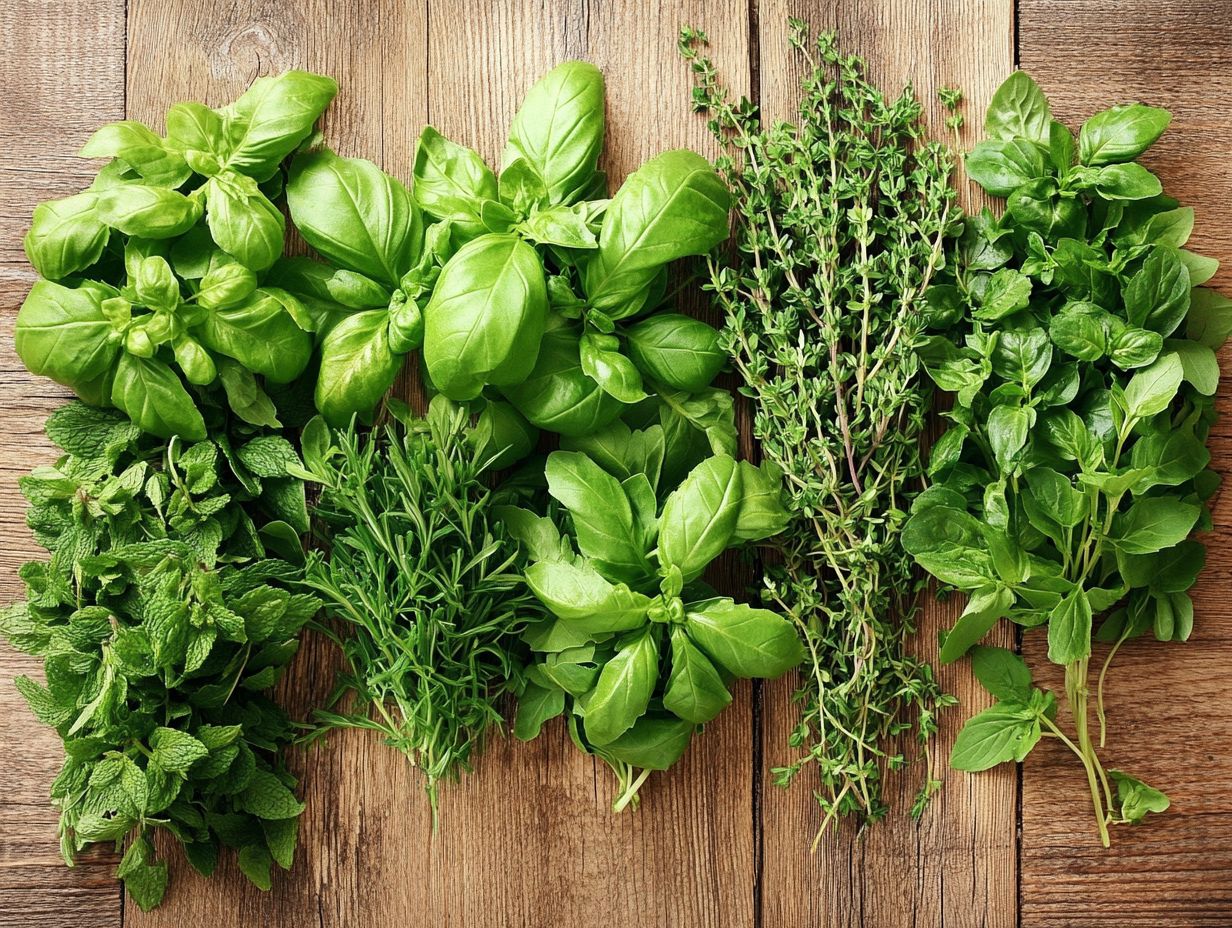
- Turmeric helps reduce inflammation and boasts antioxidant properties, making it a great addition to meals to support overall health.
- Ginger is known to aid in relieving digestive issues and nausea, making it a natural and effective remedy for these common ailments.
- Adding garlic to your diet can boost immunity and help lower blood pressure, thanks to its potent antimicrobial effects.
1. Turmeric: Anti-Inflammatory and Antioxidant Properties
Turmeric, that stunning golden spice often celebrated in traditional medicine, is truly a gem in the wellness and nutrition realm. With its remarkable anti-inflammatory and antioxidant properties, it’s no wonder experts like Jillian Kubala, a registered dietitian from Westhampton, NY, advocate for its potential health benefits in fighting chronic diseases and enhancing overall well-being.
The magic of turmeric lies in its key active compound, curcumin. Numerous studies have indicated that this powerhouse can significantly reduce markers of inflammation in your body. For example, one study revealed that curcumin supplementation led to impressive reductions in joint pain for participants suffering from arthritis.
But turmeric isn t just about its medicinal qualities; it has seamlessly integrated itself into modern kitchens, gracing everything from smoothies to savory dishes. Chefs everywhere have embraced its versatility, acknowledging not only its health benefits but also its flair for enhancing flavors. Discover how this golden spice can transform your meals and your health!
2. Ginger: Helps with Nausea and Digestive Issues
Ginger, celebrated for its remarkable medicinal properties, proves particularly effective in alleviating nausea and addressing various digestive issues. It has become a cornerstone in both traditional medicine and modern wellness practices endorsed by nutritionists like Simone Harounian.
This aromatic root has been cherished for centuries across cultures for its soothing effects on upset stomachs and its ability to combat motion sickness. In the culinary realm, ginger lends a zesty kick to an array of dishes, from savory stir-fries to indulgent desserts, showcasing its impressive versatility.
Numerous studies have reinforced ginger’s esteemed reputation, revealing that its compounds can significantly bolster digestive health, especially for those grappling with morning sickness or nausea induced by chemotherapy.
To seamlessly integrate ginger into your daily diet, consider adding fresh slices to herbal teas, blending it into smoothies, or seasoning your vegetables with powdered ginger. Each method enriches your meals while allowing you to harness the myriad health benefits ginger has to offer.
3. Garlic: Boosts Immunity and Reduces Blood Pressure
Garlic is more than just a flavorful enhancement to your favorite dishes; it s a powerful ally in fortifying your immune system and lowering blood pressure, all while offering a host of benefits that help prevent chronic diseases.
At the core of garlic s impressive attributes are allicin, a potent compound that s unleashed when you chop or crush it. This active compound is vital for boosting immune function, as it modulates the activity of your white blood cells while providing essential antioxidant protection.
Allicin also champions cardiovascular health by promoting better blood circulation and aiding in cholesterol reduction. To harness these benefits, you can seamlessly incorporate garlic into your cooking think stir-fries, soups, and marinades or roast it to soften its robust flavor.
Adding fresh, crushed garlic to your salad dressings or sauces presents yet another delectable way to enjoy its health-boosting qualities while enriching your diet.
Start incorporating these powerful herbs into your meals today for a healthier, tastier life!
4. Cinnamon: Regulates Blood Sugar and Fights Germs
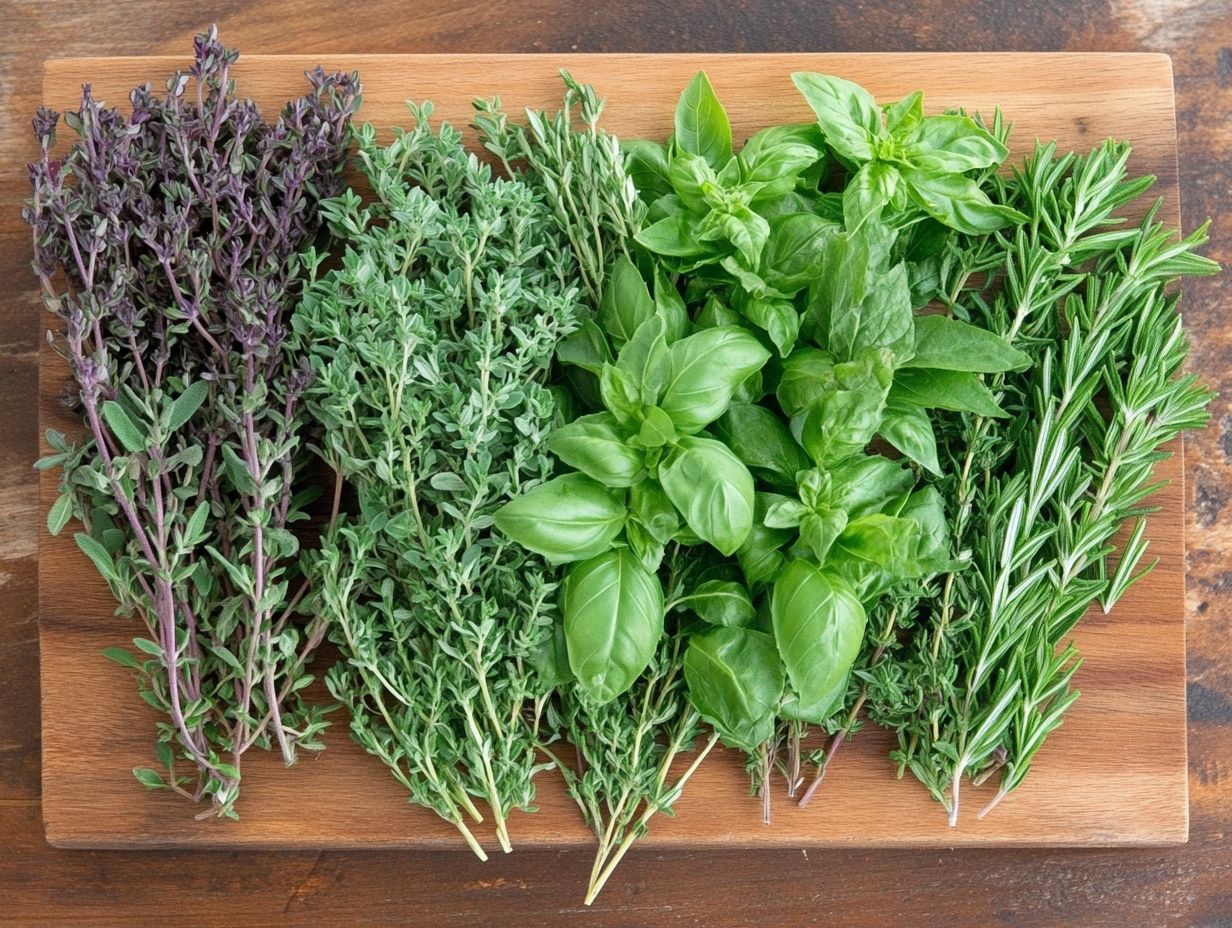
Cinnamon is known for its ability to regulate blood sugar levels and fight germs, making it a valuable herb in both cooking and overall health.
This spice increases insulin sensitivity and reduces insulin resistance, playing a crucial role in blood sugar metabolism. This is especially helpful for those managing diabetes. Its rich antioxidant properties also help protect against oxidative stress, which can lead to various health issues. Cinnamon also has antimicrobial traits that combat harmful bacteria and fungi, contributing to your overall wellness.
Incorporate cinnamon into your daily meals easily! Sprinkle it on your morning oatmeal for a delicious health boost, blend it into smoothies, or use it as an exciting seasoning in savory dishes.
5. Chamomile: Promotes Relaxation and Sleep
Chamomile, a cherished herb in traditional medicine, promotes relaxation and restful sleep, offering numerous health benefits, especially for those dealing with anxiety and depression.
This gentle flower has been valued across cultures for centuries, from ancient Egypt to modern Europe, serving as a natural remedy for tension and insomnia. Research has shown that chamomile can help reduce symptoms of generalized anxiety disorder and enhance sleep quality.
For optimal use, consider these recommendations:
- Brew fresh chamomile tea by steeping dried flowers in hot water for 5-10 minutes.
- Use chamomile essential oil in your aromatherapy practices.
Chamomile supplements can also be beneficial for those seeking a soothing hydration method, creating a calming ritual as you wind down for the night.
How Can These Herbs Be Incorporated into Your Diet?
Incorporating herbs like turmeric, ginger, garlic, and cinnamon into your meals is straightforward and enhances both flavor and nutritional value, bringing a wealth of health benefits. Additionally, exploring 5 must-have herbs for your garden can further support your wellness journey.
These culinary powerhouses can transform a boring meal into a vibrant feast. For example, add a pinch of turmeric to your smoothie not only will it brighten the color, but it also delivers anti-inflammatory properties. A dash of ginger can elevate a simple stir-fry, and garlic adds a strong base to your pasta sauces. When you sprinkle cinnamon on your oatmeal or yogurt, you’re enhancing the flavor while supporting better heart health.
By weaving these herbs with antioxidant properties into your everyday dishes, you can enjoy a delightful array of flavors and reap fantastic health benefits.
Are There Any Risks or Side Effects of Using These Herbs?
While herbs offer many health benefits, it’s essential to be aware of potential risks and side effects, particularly concerning interactions with medications and the possibility of foodborne illnesses. Additionally, exploring popular dietary supplements and their benefits can provide further insights into maintaining health safely.
Some herbs can enhance or reduce the effects of prescription drugs, leading to unintended consequences. Consulting with a healthcare provider before adding new herbs to your diet is crucial, especially if you’re taking anticoagulants or blood pressure medications.
Natural remedies may also trigger allergic reactions or worsen existing health conditions. Therefore, a personalized approach considering your unique health status and dietary needs is vital for safely navigating the world of herbs.
This thoughtful consideration can significantly impact your ability to enjoy the benefits of powerful herbs for pain relief while minimizing any associated risks.
Start adding these herbs to your meals today for a burst of flavor and health benefits!
What Are the Different Forms of These Herbs and How Are They Used?
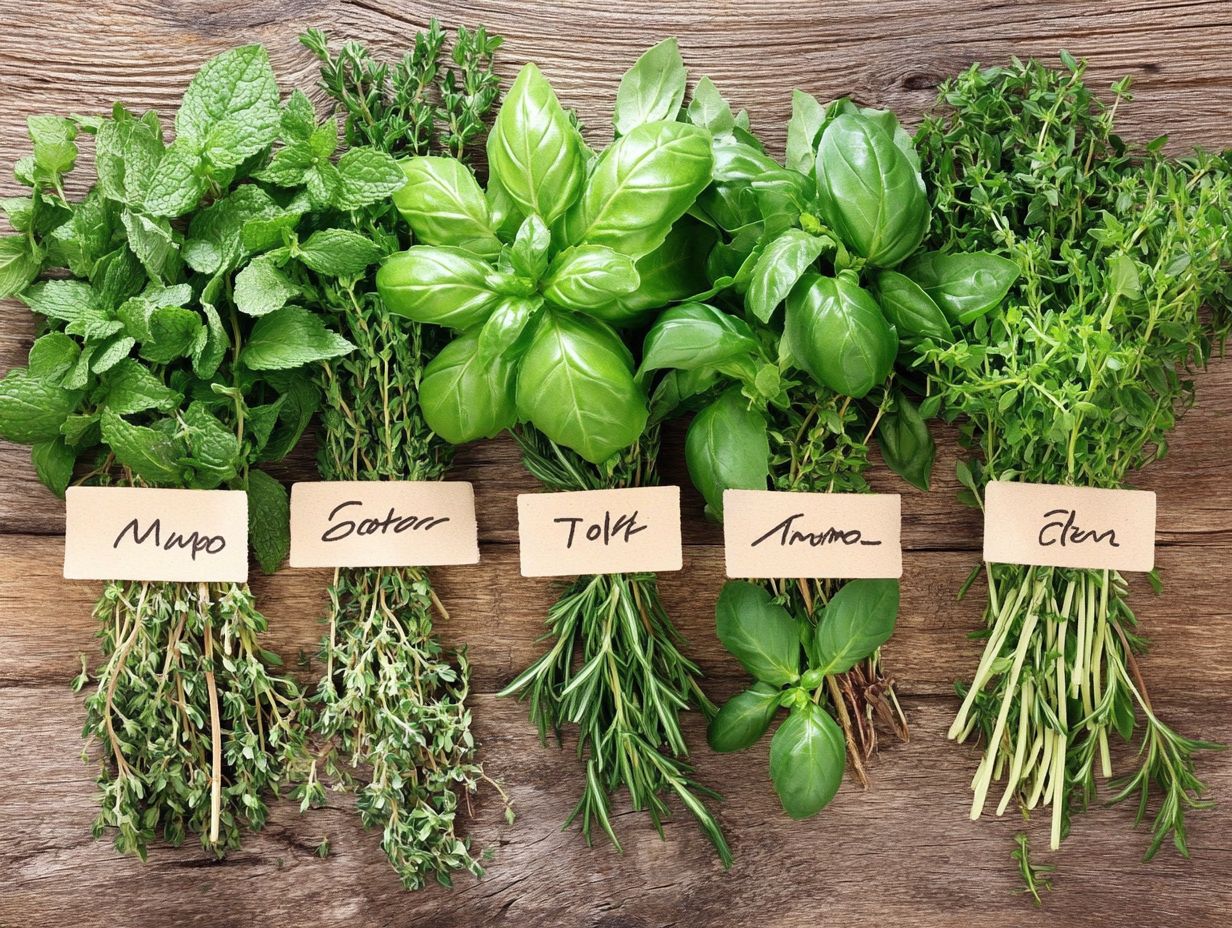
Herbs can transform your culinary experience. They come in different forms: fresh, dried, powdered, or extracts, each with unique uses and health benefits, including herbs for reducing inflammation.
Fresh herbs like basil and parsley elevate your dishes with vibrant flavor perfect for salads and garnishes. Dried herbs add longevity while deepening flavors in soups and stews.
Powdered herbs blend easily into marinades and rubs, enhancing the taste of meats and vegetables. Concentrated extracts infuse recipes without adding bulk.
To maximize these herbs’ potential, proper storage is key. Keep fresh herbs in water in your fridge and store dried herbs in a cool, dark place.
Prepare herbs just before use to optimize flavor and health benefits. This ensures every dish is both aromatic and nutritious.
What Are the Other Potential Health Benefits of These Herbs?
Herbs like turmeric, ginger, and garlic provide amazing health benefits. In addition to their uses, exploring essential oils derived from herbs can help combat chronic diseases and improve mental health conditions like anxiety and depression.
These kitchen staples contribute significantly to your overall wellness. For example, turmeric is known for its anti-inflammatory effects and may improve cognitive function.
Ginger is great for digestive relief and can help with muscle pain after workouts. Garlic boosts your immune system and helps your body fight infections.
Incorporating these popular herbs with culinary uses into your diet can unlock lesser-known benefits for a healthier lifestyle.
How Can One Grow and Harvest These Herbs at Home?
Growing herbs at home is rewarding and enhances your culinary experience. Start by selecting herbs like basil, rosemary, or mint.
These herbs bring unique flavors to your kitchen. Ensure they have a warm spot with plenty of sunlight ideally six to eight hours a day and well-draining soil that retains moisture.
Trim your herbs regularly for bushier growth. Harvest them in the morning to capture the best flavor and potency.
Taking only what you need allows the plant to thrive. This enriching process not only improves your home-cooked meals but also supports mental well-being.
What Are Some Delicious Recipes Using These Herbs?
Recipes using herbs like turmeric, ginger, and garlic can turn any meal into a flavorful and healthy experience.
These vibrant ingredients unlock a world of flavor. Turmeric adds warmth to curries, while ginger gives a zesty kick to stir-fries.
Garlic enhances sauces and marinades while boosting your immune system. Explore a variety of easy-to-follow recipes across different cuisines.
Your meals will be both nutritious and delicious!
Frequently Asked Questions
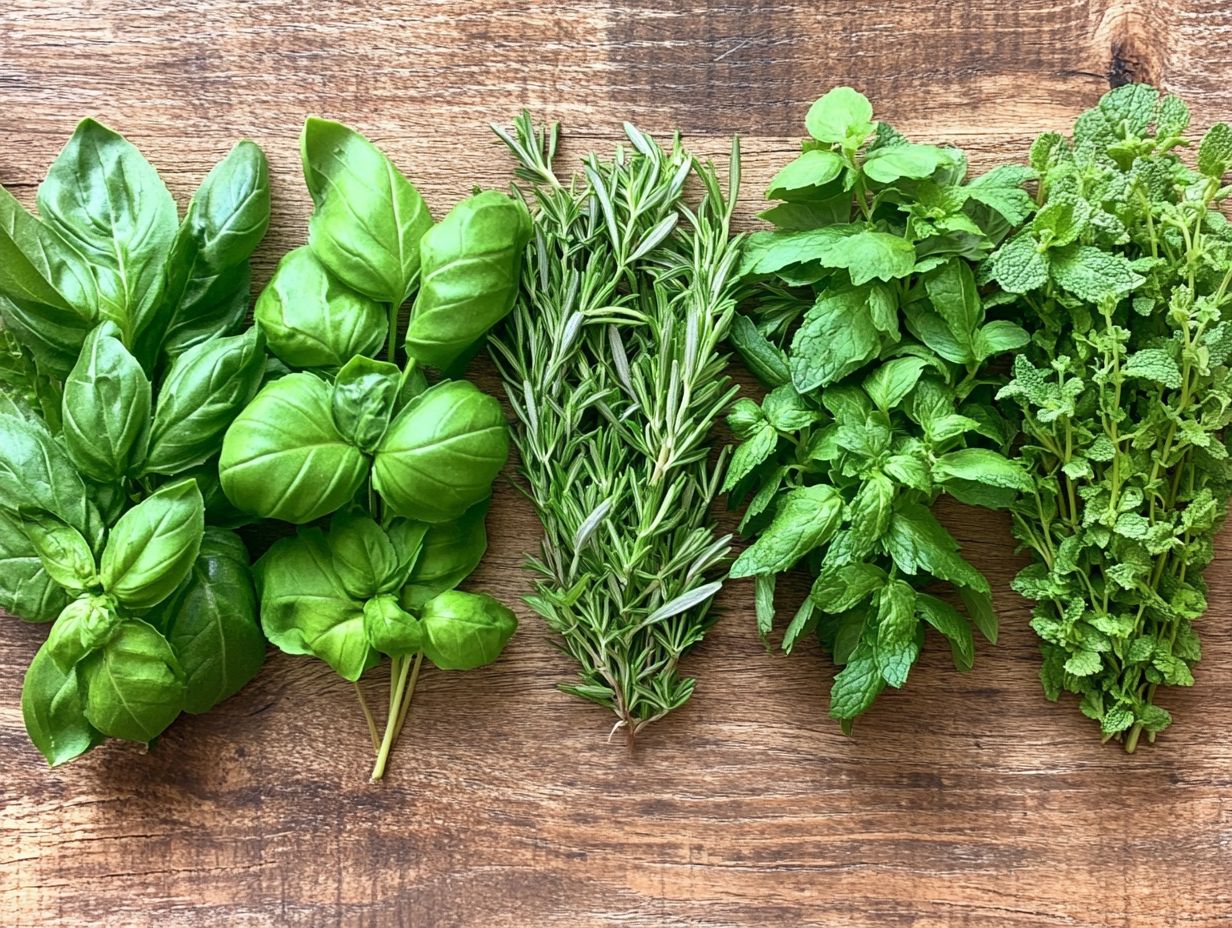
What are 5 common herbs and their benefits?
Discover the five common herbs: rosemary, basil, ginger, turmeric, and garlic, each with unique health benefits that you can explore further in 5 herbs known for their culinary and medicinal uses!
What are the benefits of rosemary?
Rosemary helps reduce inflammation and improves digestion. It may even boost your memory and focus!
What can basil be used for?
Basil can help relieve stress and anxiety. It also aids digestion and fights inflammation!
How can ginger benefit our health?
Ginger is great for combating nausea and indigestion. Plus, it supports heart health!
What are the potential benefits of turmeric?
Turmeric is loaded with antioxidants and can help your brain function better. It’s also great for joint pain!
What are the benefits of using garlic in cooking?
Garlic boosts your immune system and can lower cholesterol. It s a tasty way to support heart health!



